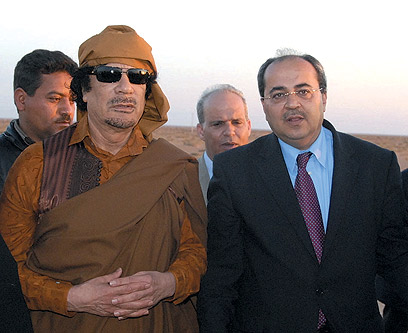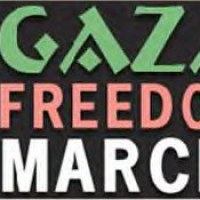![]()
Wed, May 25, 2011 | Edited by Crethi Plethi

Arab Knesset member Ahmed Tibi (R) next to Libyan dictator Muammar Qadhafi during a visit (with other Arab Knesset members), last year.
The ‘Radical Agenda’ of Israel’s Arabs
Are Israel’s Arabs turning into an enemy from within? The Jerusalem Post published an article by Ben Hartman on Wednesday about Dan Schueftan’s new book in which he sound the alarm about what he calls the extremist threat to Israel posed by the leadership of the Israeli Arab community.
At the very moment when the Arab World is in turmoil (Arab revolutions, recent Nakba Day events, and Palestinians set to declare statehood unilaterally at the UN in September), Middle East expert Professor Dan Schueftan of Haifa University released a new book — “Palestinians in Israel — The Arab Minority’s Struggle Against the Jewish State” — which, he asserts, ‘is the most authoritative and well-researched book on the subject of Arab citizens of Israel to date.’
Schueftan has been studying the Israeli Arab community for over 40 years. Israeli journalist, Roni Shaked, describes in a YnetNews article Schueftan’s work environment as follows:
Schueftan’s study is crammed with crates filled with documents about the issue. He has collected every word published in newspapers, both in Israel and abroad. He has documented every Knesset speech and has all televised documentation from 1990 and onward. The material he gathered about Knesset Member Ahmed Tibi alone can fill a room…This work and analysis effort prompted the publication of his latest book.
“On the political level, we have no option for a solution on the issue of Arabs in Israel,” Schueftan asserts today. “They are unwilling to accept a solution that is less than what is perceived as the Jewish nation-state’s suicide. We are dealing with an especially difficult branch of the complete rejection of the Jewish state in the Arab world.”
“The desirable process for preserving Israel as a Jewish, democratic state is to secure a historic compromise with the Arab world,” he says. “This requires difficult compromises on the security front and in respect to our attachment to the cradle of Jewish civilization. This process raises the need to contend with a large minority of more than a million Arab citizens, who are fighting from the inside against Israel’s Jewish, democratic character and identity.”
“This will be Israel’s great dilemma domestically, vis-à-vis Europe, and later vis-à-vis the Untied States as well,” Schueftan says. “Even if a solution is found to the conflict with the Arab world and with the Palestinians, this will be the next area where they will try to de-legitimize Israel.”
Israel’s Arabs are demanding “recognition of the Palestinian collective as a national minority granted a recognized status, while eroding the state of Israel’s national Jewish aims to the point of annulling them. The Jewish nation-state is illegitimate in the eyes of the main camp within Israel’s Arab minority, even if an Arab-Palestinian state is established alongside Israel in the same land, between the Jordan River and Mediterranean.”
Their “strategy is to attack the Jewish establishment from the inside, using the democratic means of the State and of society, in the name of democracy, pluralism and human rights.”
Source: YnetNews, April 21, 2011
Schueftan spoke to The Jerusalem Post at his multi-level apartment in Givatayim last week about his new book.
“Actually, these are three different books that became one book, because I wanted to get a comprehensive picture of what is happening in Israel with the Arab citizens of Israel,” he says. “First of all, it’s a historic book that discusses the relationship between Jews and Arabs in Israel in the broad global and regional context and in the context of domestic developments within Israeli society and Arab society [in the country]. The second is a political book that focuses on the political positions of the Arab political leaders and Arab elites and Arab public opinion [here]. The third part is a social economic analysis that tries to determine the extent of the Arab economic and social problems and what is the major origin of it.”
Hartman writes in his JPost article that Schueftan draws a line between Muslim Arab and Christian Arab society. He argues that the main divide here is not between Jews and Arabs, but between those who have embraced modernity and those who have not.
“The socioeconomic divide isn’t between Jews and Arabs, [but] between haredi Jews and Muslim Arabs on the one hand, and nonharedi Jews and Christian Arabs on the other. The reason that is more meaningful than any other elements combined is the unwillingness of the Muslim Arabs to do what the Christian Arabs have done and what most of the non-haredi Jews have done, namely to adjust themselves to the modern world, primarily by having smaller families and both spouses working.”
Beyond the socioeconomic issue, Schueftan states that the book will shed light on what he says is a widespread radical agenda of delegitimization and extremism directed at Israel by the elite of its own Arab citizens.
“If you speak of the hostility of the Arab political leadership [in Israel], I think most Jews in Israel and most observers would agree that they are very radical. But if you look at the Arab elites… you would find that the depth of hostility and the inability to reach any kind of compromise because they insist on the destruction of everything the Jews have constructed as a collective, is much stronger than most people would assume.”
Schueftan makes a distinction between the average Israeli Arab on the street and the political and cultural elite who he says are responsible for driving the engine of radicalization, even though the difference between those elites and the public that elects and supports them is at times murky.
“These [Arab Israeli] elites, with the support of public opinion, basically say that the existence of Israel was born in sin. In other words, that the act of the establishing Israel was an act of colonialism that had no justification whatsoever, and Israel continues to live in sin because the basic tenets of Israel and the way that Israel treats its environment is colonial. Essentially the Jewish state is profoundly illegitimate. It was born illegally, exists illegally and its essence is illegal. A Jewish state by definition is illegal because Arabs don’t recognize the existence of a Jewish people.”
This radicalization was prompted by the Oslo process, according to Schueftan.
“During the Oslo era, the Arab leadership learned to recite slogans associated with human rights and pluralism at the service of an idea meant to strip the Jewish people of its right for self-determination in its own nation state,” he says in the YnetNews interview.
And Schueftan sees no chance for a solution between Jews and Arabs as long as they continue to believe in the principles and national desires that they hold dear.
“I’m saying, under the prevailing circumstances, there is no solution to the problem that Arabs and Jews have with each other as an Arab minority in a Jewish state. There is no solution unless one of the parties dramatically changes structural parts of its attitude. The real question is not what is the solution, but how do you live as long as possible without a solution.”
[…]
“The first thing is to continue what we were doing, which is deepening the civil equality in Israel, not only between Arabs and Jews, but also between the periphery and the center. When it comes to Arabs, I’m sure it will not help because the more educated they are, they won’t be less radical — if anything, more radical. But for my own needs, I want to live in a state that doesn’t have unjustified discrimination, so I want to obliterate what little is left of it. Not because it will improve relations between Jews and Arabs, but because having a strong, equal society is something that will strengthen my own society,” he says.
“At the same time I want to strengthen the Jewish side of Israel. We must, for instance, legislate that Hebrew will be the official language. Because everything that will strengthen the Jewish and democratic nature of Israel is the best form of damage control vis-à-vis what we can do with the Arab minority in Israel.”
“What we did in Gaza [Disengagement 2005] was a tremendous success. My objective was not to have a friendly Palestinian neighbor. I never thought this was a possibility. My objective was to have a stronger Israeli society, and Israel without Gaza is a stronger Israeli society than when we are sitting in Gaza. Not because it will bring peace or the Palestinians deserve it, but because I want a stronger Israeli society because I know there won’t be peace,” he states.
“The settlements in Gaza were never viable to begin with, and good riddance. This is also true of the settlements in the populated heartland of the West Bank. If this book has an effect similar to my previous book, I’ll be delighted.”
Source: JPost, May 25, 2011.



 RSS
RSS










The ‘Radical Agenda’ of Israel’s Arabs | #Israel #Palestinianism #Arabs http://j.mp/ixQkBK
The ‘Radical Agenda’ of Israel’s Arabs | #Israel #Palestinianism #Arabs http://j.mp/ixQkBK
The ‘Radical Agenda’ of Israel’s Arabs | #Israel #Palestinianism #Arabs http://j.mp/ixQkBK
The ‘Radical Agenda’ of Israel’s Arabs | #Israel #Palestinianism #Arabs http://j.mp/ixQkBK
The ‘Radical Agenda’ of Israel’s Arabs | #Israel #Palestinianism #Arabs http://j.mp/ixQkBK
The Radical Agenda of Israel’s Arabs – http://t.co/H4sJXQI عرب اسرائيل بين سنديان العرب و مطرقة اليهود #Palestine #Israel
RT @Reema_00 The Radical Agenda of Israel’s Arabs – http://t.co/q8zF43j عرب اسرائيل بين سنديان العرب و… http://t.co/2bKCYqi #isratine